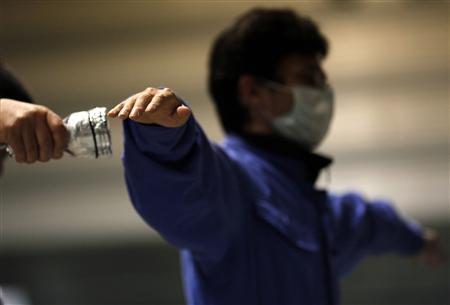|
Fear Of Radiation From
Fukushima Accident Led To Psychiatric Disorder
Hospitalizations

Fukushima Radiation Fear
EMF Computer Protection
Magnetic Field Detector
Some 24.4 percent of people who were
hospitalized in Fukushima with psychiatric disorders in the
wake of the outbreak of the crisis at the crippled Fukushima
No. 1 Nuclear Power Plant had done so possibly because of
fears of radiation exposure, according to the results of
research conducted by psychiatrists at Fukushima Medical
University.
It has also been found that of all the
outpatients at 27 hospitals in Fukushima Prefecture, 30
percent of them visited hospital apparently for reasons
related to the nuclear crisis, according to the research
conducted by psychiatrist Akira Wada and others at Fukushima
Medical University. There is no data available in the world
on the effects of nuclear accidents on psychiatric diseases
that were taken immediately after a nuclear accident, and
therefore Fukushima Medical University plans to conduct a
follow-up study on the effects on patients of the major
nuclear accident and prolonged lives as evacuees.
Wada and others at Fukushima Medical University
carried out a survey at 30 hospitals in Fukushima Prefecture
for two months from March 12, 2011, and 27 of them responded
to the survey.
Of the 610 inpatients who were admitted or
readmitted to hospital, with men accounting for 49 percent
and women for 51 percent, excluding those who were
transferred to other hospitals because of the nuclear
disaster, 74 of them, or 12.1 percent, were diagnosed as
being related to their fears of radiation exposure, while 75
others, or 12.3 percent, were diagnosed as being possibly
related to their fears of radiation exposure. People from
the Soma, Futaba and Iwaki areas, which are close to the
troubled nuclear power station, account for 23 to 27
percent of such inpatients.
Of all the 74 inpatients whose hospitalization
was diagnosed as being related to their fears of radiation
exposure, nine of them had never had consulted psychiatrists
before. Most of the 74 people were admitted or readmitted to
hospital within one month from the outbreak of the nuclear
disaster, and nearly half of them were in their 40s and 50s.
There were cases of people who were suffering from stress
from living in evacuation centers in addition to their fears
of radiation exposure.
At the same time, Itaru Miura, assistant
professor at Fukushima Medical University, and others
conducted a survey on outpatients at 77 hospitals and
clinics in Fukushima Prefecture once a week for three months
from March 12, 2011, to which 57 medical facilities
responded.
Of the 410 outpatients at the medical facilities
who were suffering from depression or anxiety disorders, 78
of them, or 19 percent, were diagnosed as being linked to
the nuclear disaster, and 55 others, or 13.4 percent, were
diagnosed as being possibly related to the nuclear disaster.
Of all the 133 patients, 47 of them were suffering from
depression and 38 others were suffering from acute stress
disorder and posttraumatic stress disorder (PTSD), and 38
other outpatients were also suffering from adjustment
disorders. Nearly half of them had stress from their lives
as evacuees, 40 percent of them were worried about the
effects of radiation on themselves, and 30 percent of them
expressed fears that their children and families could be
affected by radiation.
There were reports on the mental effects of
radiation from the troubled Chernobyl nuclear power plant,
but the research was conducted about 10 years after the
outbreak of the nuclear disaster. Shinichi Niwa, professor
at Fukushima Medical University, said, "I have the
impression that the nuclear accident had such a great impact
(that many people were admitted to hospital). Take
decontamination work for example, people can feel secure if
they do it themselves, rather than if they ask others to do
it. It is also important to ease anxieties over radiation
exposure with participation of local residents in such a
program."
(Mainichi Japan) March 26, 2012
http://www.emfnews.org/store |
